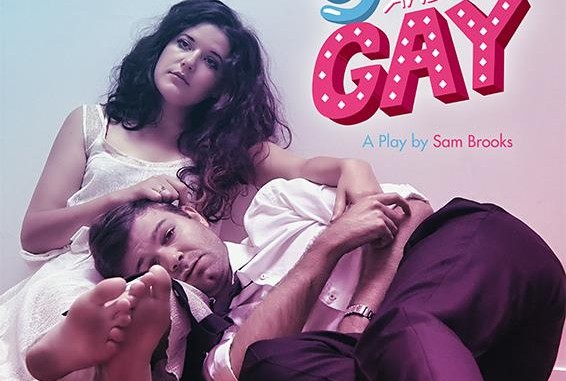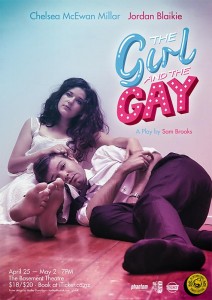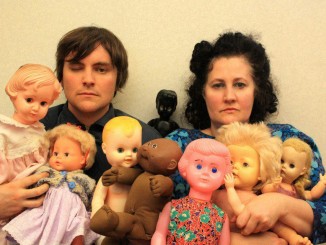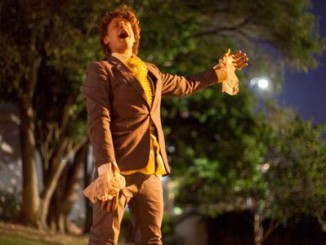
Grindr Profile: Looking for Laughs [by James Wenley]

The font is bold and cartoonish, a pretty blue and pink wash covers the poster, which suggests one should expect a bright and breezy comedy. But the photograph sells a different show. Co-stars Chelsea McEwan Millar and Jordan Blaikie lie strewn on the floor, a look of earnest despondency on their faces. The marketing material of The Girl and the Gay sums up all too well the show’s major flaw as a comedy. We’ve been invited to the emotional hangover, rather than the party itself.
As expected, Brooks resists the trite stereotype of a woman and her gay best friend going out and having fabulous adventures – this as far away from Will & Grace as you can get. The Girl and the Gay’s major question is as what point do your youthful transgressions become tragic, and you have to grow up. As for their relationship, Chip (McEwan Millar) and Hank (Blaikie), might bond over a beer, but their friendship has some rather deep fissures. They half-joke that they’re stuck with each other because no-one else will be friends with them. Hank is a guy who just happens to be gay, in so much that Chip just so happens to be a straight woman. However whereas her sexuality barely figures (she’s looking for a job, not a man), his sexuality is emphasised by the ways he doesn’t fit the stereotypes through his quest for a new partner. Indeed, categorising his Grindr tribe (bear, twink, otter etc) becomes an amusingly laborious process.
We meet the pair at a point of a crisis and transition – she’s lost her call centre job through inappropriate phone manner (“I’m not racist, just enthusiastic”) and he’s just been dumped. Since his name isn’t on the lease, he has to go crash with Chip (and yet he’s still been conned into paying rent at the other place). Cue endless scenes of bickering, despairing, and drinking on the couch.
The charm of McEwan Millar’s character turns out to be her innocent disregard for empathy and penchant for saying whatever is on her mind, though this slacker exterior masks some real concerns with how her late-twenties life is turning out. Blaikie uses his character’s neuroticism as a crutch, and therefore is a less obviously comic turn than McEwan Millar’s. Rather than laughing with (or at) him, we worry for him.
And thus the issue, despite what the marketing description says, they aren’t that much fun to be around, at least in the given scenario. No problem perhaps for a drama, but in the context of the International Comedy Festival 2015 in cahoots with Old Mout Cider, Brooks’ play is at cross-purposes. There is a stream of clever pop-culture references to get the laughs going (though some of the more obscure ones might leave you scratching your head) and if you follow Brooks esoteric Twitter feed (performance art in itself) you get an idea of what to expect. There are things in this script that one imagines only Brooks thinks about, such as what happened to Jennifer Love Hewitt’s career. There are New Zealand politics gags too, courtesy of Hank’s job as assistant to Jacinda Ardern, though I suggest the running gag about Tariana Turia, which meets with silence each time, needs a rethink. It’s one of those “[insert an incongruous name]” gags, and doesn’t work.
The show picks up when Chip and Hank finally finish pre-loading and hit the clubs for a disastrous night. Well, semi-disastrous. This could have been a high comic moment for the show, but the scenario (wherein as older clubbers they make fools of themselves) was not extended far enough to justify the emotionally loaded pay-off. Earlier, Hank offers to fake a reference for Chip, but this is never acted on. Utilising the law of unintended consequences, that could have been very funny indeed. Similarly, Chip could well-meaningly do more to interfere in Hank’s love life. The script needed to find opportunities like these to escalate the action, rather than relying on couch banter to generate the humour.
Maybe there’s a better play here one placed outside the pressures of the Comedy Festival Context. I can see how the play could re-orientate itself as a drama, especially as the characters already resist stereotyping. As it is, it’s stuck in a pop-culture literate social realist mode: too trivial for a drama, but not nearly entertaining enough to satisfy the comedy dollars.
The Girl and the Gay is presented is presented as part of the NZ International Comedy Festival 2015 and plays at The Basement until 2 May. Details see Comedy Festival.




Leave a Reply